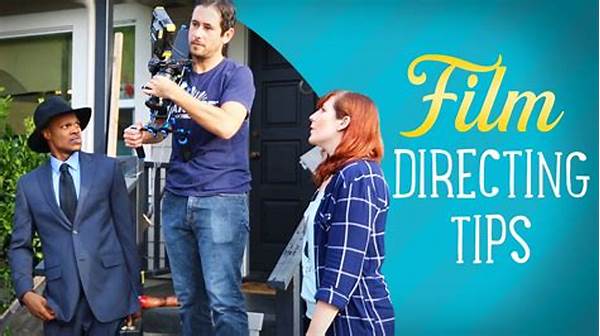Once upon a time, in a small town nestled between rolling hills and vast fields, there lived a young filmmaker named Alex. With a heart full of dreams and a borrowed camera, Alex set out to explore the art of directing. The journey wasn’t easy; it was filled with days of passionate storytelling, sleepless nights of editing, and a relentless pursuit of perfection. But through every struggle, Alex discovered the essence of directing—a delicate dance of creativity, vision, and leadership.
Read Now : Broadway Farewell Performances Highlights
The First Steps of Directing
In the early days, Alex felt like an artist with a blank canvas, unsure where to make the first brushstroke. Directing techniques for beginners often feel daunting, like navigating a ship through uncharted waters. However, as Alex immersed into this world, the art of directing gradually unfolded its secrets. Understanding camera angles, playing with lighting, and working alongside actors were just a few of the components that began to form a clearer picture.
One evening, during a local filmmaking workshop, Alex learned the importance of collaboration. Directing wasn’t just about having a vision; it was about bringing that vision to life through teamwork. Guiding actors to embody their characters, experimenting with creative shots, and understanding the nuances of storytelling brought color to the once intimidating landscape. In time, the fear of beginning transformed into a thrilling adventure where every scene became an opportunity to create something extraordinary—a hallmark of directing techniques for beginners.
Creating a Vision
Alex soon discovered that a great director needs to have an unwavering vision. Each scene had to be meticulously planned yet flexible enough to allow creativity to flourish. The magic of directing techniques for beginners lies in understanding that every frame is a piece of art, waiting to tell a part of the story that words alone could never capture.
Through trial and error, Alex realized that mastering directing techniques for beginners necessitated patience and perseverance. Not every shot would be perfect, and not every idea would work. It was in these moments of failure that Alex learned the most, slowly shaping into a more adept and insightful director.
Essential Tools for Novice Directors
1. Discovering Your Style
Alex learned that directing techniques for beginners often start with finding one’s unique storytelling voice—a style that resonates and captivates audiences.
2. The Power of Collaboration
In the world of filmmaking, collaboration isn’t just a technique; it’s a necessity. Working with a team brings fresh insights and enhances the creative process.
3. Storyboarding: A Visual Blueprint
Creating storyboards allowed Alex to visualize each scene, turning abstract ideas into concrete plans—a crucial step in directing techniques for beginners.
4. Mastering the Art of Communication
Being able to convey ideas clearly to cast and crew is vital. Effective communication can transform a scene from good to unforgettable.
5. Experiment with Camera Angles
Alex found that playing with different camera angles could dramatically change the story’s perspective, a vital element of directing techniques for beginners.
Read Now : Key Elements Of An Audition Resume
The Growing Journey
Building upon these early lessons, Alex’s journey was one of continuous growth. Each new project presented challenges that required problem-solving and adaptation. Directing techniques for beginners were no longer just guidelines; they became second nature in the creative process. Embracing the unpredictability of filmmaking, Alex learned that often the most spontaneous moments led to the most memorable shots.
The feedback from audiences evolved from polite applause to genuine admiration. It was through vulnerability—allowing the films to be an authentic expression of personal truth—that Alex connected with viewers. This transformation reflected not just mastery over directing techniques for beginners, but a profound exploration into the world of cinematic creation.
Common Mistakes
Venturing into directing can be overwhelming, and Alex wasn’t immune to mistakes. The first and most costly error was losing sight of the bigger picture. New directors often get bogged down in details, forgetting the overarching narrative. Directing techniques for beginners encourage stepping back every so often to embrace the complete vision and adjust course as needed.
Another frequent misstep involved neglecting the actor’s input. Initially, Alex was rigid, focusing solely on personal ideas. But, listening to actors, understanding their interpretation, and allowing them creative freedom proved invaluable. It was a tough lesson that honed Alex’s skills, teaching that directing isn’t about control but guidance—navigating shared artistic waters with respect and open-mindedness.
Building Your Directorial Foundation
As the sunlight filtered through the woodland trees, casting intricate shadows upon the ground, Alex found a spot by the river, reflecting on the journey from a novice filmmaker to an evolving director. The path filled with directing techniques for beginners was one punctuated by self-discovery, growth, and countless stories yet to be told. With every film, the mastery of storytelling deepened. Technical skills sharpened, and Alex envisioned future projects that promised wider horizons and unbounded creativity.
In the end, the most profound realization was not in perfecting the craft but in the human connections forged through storytelling. Every cast and crew member, every viewer who sat entranced by the narratives created, and every emotion stirred echoed the realization of dreams that began on a quiet afternoon with a camera and a young director’s heart full of ambition.
Nurturing Your Passion for Directing
Directing, Alex realized, was as much about heart as it was about skill. The passion that sparked the initial desire to direct must be nurtured and fed, even when the journey feels daunting. As new filmmakers begin navigating the intricacies of filmmaking, cultivating a love for the craft will fuel perseverance and ignite creativity. Directing techniques for beginners offer a structured approach to learning, yet the heart and soul behind the lens define the director’s signature. For Alex, this passion became the compass that directed the journey, guiding projects towards innovative horizons and ever-evolving narratives.
